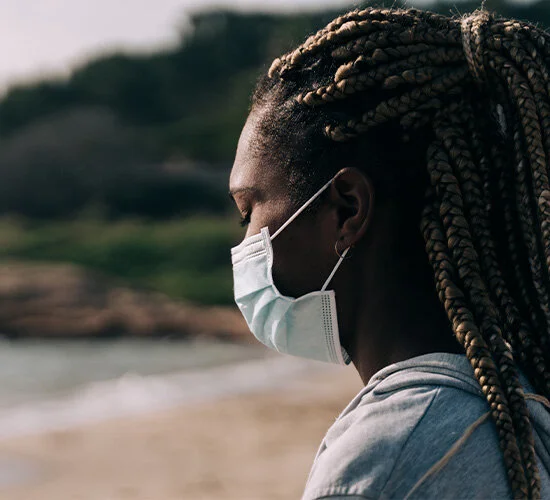The Role of Somatic Symptoms in Anxiety and COVID-19
Have you ever experienced that feeling right before a presentation; the one where you feel you might just burst from the nerves of having to stand up in front of a group of people?
Maybe your chest felt tight, your breathing heavier than normal and you might even have felt a bit of a stomach ache. No matter how prepared you feel for a presentation, sometimes these nerves and symptoms are inevitable.
If this has happened to you, you may have experienced somatic symptoms.One of the many implications of COVID-19 has unfortunately been a surge in mental health concerns (related: A Cognitive-Behavioural Approach to Coping with COVID).
More than ever, we are seeing individuals coming forward who are having difficulty with anxiety, depression, motivation, and pre-existing conditions that have worsened over the course of the pandemic. Not only are hospitals experiencing overcrowding and shortages of ICU beds and resources, but the psychiatric wards are seeing an influx of patients as well.
A study conducted in 2020 of 5,412 US Citizens reported a 40% increase in mental health concerns over the course of the pandemic to date, with 30% of those individuals reporting significant increase in anxiety and depression symptoms (Czeisler, Lane, & Petrosky, 2020).
Similarly, in a recent poll, the Centre Addiction and Mental Health in Canada reported 50% of Canadians reporting worsening mental health since the pandemic beginning, along with 41% reporting an increase in experiencing anxiety (CAMH, 2020). Canadian hospitals are noticing a significant uptick in the amount of mental health inpatients that are being admitted, along with increased ER visits.
Evidence suggests a large increase of patients are coming to the ER with somatic symptoms and medically unexplained symptoms over the course of the pandemic (Shelvin et al, 2020). This finding suggests that more than ever, people are experiencing anxiety for the first time, and may be going to the hospital in fear that they are in medical distress and require immediate assistance.
Understanding what somatic symptoms and how to manage them are can help you feel prepared the next time you experience anxiety.
What are Somatic Symptoms?
If you’ve ever experienced anxiety or an anxiety attack, you may notice that your body physically responds to the anxiety. You may notice that your heart rate increases, you become sweaty, shaky, or chest tightness to name a few. This is because when experience anxiety, our bodies can enter into fight or flight mode. This then causes a surge of physical symptoms, of which we refer to as somatic symptoms.
Understanding the role of somatic symptoms in the presence of anxiety can be a helpful tool in aiding your knowledge about your personal experience of anxiety. Some individuals report experiencing significant somatic and physiological symptoms when anxious, and others report none and as such provides evidence that everyone is a little bit different in their experience of anxiety.
Some of the most common Somatic Symptoms are :
breathlessness
feelings of panic
chest tightness
stomach ache
gastro-intestinal distress
insomnia
exhaustion
restlessness
Somatic symptoms can be unsettling if you’ve never experienced anything like it before. Some of the symptoms could easily be mistaken for other medical concerns, and as such, hospitals are noticing an influx of patients seeking out emergency medical care only to find that they have medically unexplained symptoms (Shelvin et al., 2020).
Recommendations following a study conducted in the UK on COVID-19 anxiety and related somatic symptoms offered the suggestion of releasing public health messages explaining the implications of stress, worry, and anxiety that individuals may be experiencing as a result of the pandemic and how these can manifest into increased levels of physical/somatic problems. The purpose of this message was in hopes of alleviating additional strain on the medical systems and equipping individuals with the tools necessary to detect and understand their symptoms and alleviate stress and fear in individuals (Shelvin et al., 2020).
Providing individuals with the knowledge and understanding of anxiety, how to detect anxiety, and coping skills can allow for a lessened strain on the health care and overall better mental health management for citizens enduring the pandemic.
Understanding and Detecting Anxiety
One school of Psychology that helps to understand the origin of anxiety disorders is Evolutionary Psychology (EP). EP believes that the function of emotions have evolved to organize aspects of our environment and appropriate responses.
For example, if we are out hiking and encounter a bear, we may become fearful. This experience of fear causes a rush of adrenaline, a hormone and chemical messenger in the brain that triggers an anxious reaction. This reaction then activates our sympathetic nervous system, sending our body into fight or flight mode, heightening our senses to our environment as a perceived threat is imminent.
Evolutionary Psychology helps us understand origins of anxiety and the role that it plays in our primal brain as a fear response. Anxiety is a typical human emotion, one that is very much imperative to our survival. In modern society, anxieties have evolved and now circle around money, work, family stress, life and health.
While still stressful, they do not necessarily elicit the same type of fight-or-flight response than would be expected when we encounter imminent danger. Anxiety becomes problematic when we enter fight-or-flight mode even when the perceived and real threat is not proportionate to the level of fear that we are experiencing.
The COVID-19 pandemic is one such example of a situation that has caused a significant increase in anxiety. If anxiety is not something you have experienced frequently it can be difficult to discern the symptoms.
Some of the most common symptoms of anxiety to look out for are:
excessive worry; finding it difficult to control the worry
irrational thinking
ruminating thoughts
nervousness
panic
fear or avoidance
difficulty relaxing
catastrophizing (thinking the worst will happen)
aching muscles
sweating
increased heart rate
Coping with Anxiety
When anxiety heightens, it can feel incredibly difficult to get a hold of and manage the symptoms you are experiencing. Coping skills allow the opportunity for anxiety to become more manageable, allowing for individuals to feel as though they are able to gain control of their anxiety and lessen symptoms
Grounding Techniques
One of my favorite techniques for working through anxiety in the moment is utilizing a grounding technique. Anxiety forces our minds out of the present moment and into the future; worrying about the what if’s and the possible things that could go wrong, or it forces us into the past, thinking about what we have done wrong or what we should have done better. Rarely does it allow us the opportunity to be in the here and now.
Grounding techniques allow our bodies to return to homeostasis, and if done consistently, they can be a great tool in helping us to regulate the somatic symptoms that may be experienced with anxiety.
5-4-3-2-1
A simple grounding technique you can easily implement into your coping skills is 5-4-3-2-1. As the same suggests, this technique gets you to observe your surroundings and find five things that you can see, four things you can touch, three things you can hear, two things you can smell, and one thing you can taste.
Give this a try next time you find yourself ruminating on a thought.
Box Breathing
The next best thing you can do for anxiety is breathe. That’s right, just breathe!
Box breathing is an excellent technique that involves breathing in slowly for four counts, holding your breath for four counts, and releasing your breath for four counts. Repeat this as many times as you would like.
The purpose of intentional deep breathing is that it plays a role in calming your autonomic nervous system (ANS), which is involved in our stress response and anxiety (Peterson, 2017).
Get Active
At this point I’m sure this is not the first time you are hearing that activity supports our mental health. However, it really truly is one of the best things we can do for our body and minds.
Integrating some type of movement for 20-30 minutes minimum each day will greatly increase your positive endorphins and support your body in decreasing anxiety by regulating cortisol, our stress hormone.
It can be a challenge to find ways to be active while gyms are closed, but get creative if you can! Sunshine and Vitamin D are your best allies as well, and getting outside for even 10-15 minutes can support in combating negative effects of anxiety and depression. Try incorporating a bit of movement and fresh air into your daily routine and see the positive benefit that it can add to your life.
Therapy for Anxiety and Somatic Symptoms at FP Counselling
Anxiety, along with the experience of somatic symptoms can be a very troubling feeling, especially if you have never gone through something similar before. At times, it may feel that it can be difficult to manage these symptoms alone. If you are currently experiencing heightened anxiety through the pandemic know that you are not alone and can seek the support of a mental health professional.
At FP Counselling we utilize a variety of therapeutic approaches tailored to best suit our clients’ needs and aid them in feeling their best.
We offer a free 20-minute phone consultation with one of our therapists so that you can get a chance to meet us and ask any questions you may have prior to booking a session. If you feel that we would be able to support you with your anxiety, we would love to hear from you and look forward to supporting you.
References & Further Reading
Centre for Addiction and Mental Health (CAMH). (2020). Mental Health in Canada: Covid-19 and Beyond. Retrieved from: https://www.camh.ca/-/media/files/pdfs---public-policy-submissions/covid-and-mh-policy-paper-pdf.pdf
Colizzi, M., Bortoletto, R., Silvestri, M., Mondini, F., Puttini, E., Cainelli, C., Gaudino, R., Ruggeri, M., & Zoccante, L. (2020). Medically unexplained symptoms in the times of COVID-19 pandemic: A case-report. Brain, behavior, & immunity - health, 5, 100073. https://doi.org/10.1016/j.bbih.2020.100073
Barger. L., Christensen, A., Czeisler, C., Czeisler, ME., Christensen, Facer-Childs, E., Howard, M., Njai, R., Lane, RI., Petrosky, E., Rajaaratnam, S., Robbins, R., Weaver, M., Wiley, J. (2020). Mental Health, Substance Use, and Suicidal Ideation During the COVID-19 Pandemic. DOI: http://dx.doi.org/10.15585/mmwr.mm6932a1external icon
Meek, W. (2020). The Evolutionary Psychology of Aging. Retrieved from https://www.verywellmind.com/evolution-anxiety-1392983#:~:text=Obviously%2C%20anxiety%20and%20fear%20are,focus%20on%20doing%20things%20well.
Peterson, L. (2017). Decrease Stress by Using Your Breath. Retrieved from: https://www.mayoclinic.org/healthy-lifestyle/stress-management/in-depth/decrease-stress-by-using-your-breath/art-20267197?pg=2

Schedule a Free Consultation
Get to know us a little before you book a session with a 20-minute phone consultation.
Feel free to reach out to us directly at any time, or provide your email address and we will get in touch to schedule one with you.








